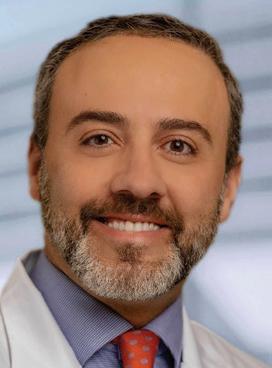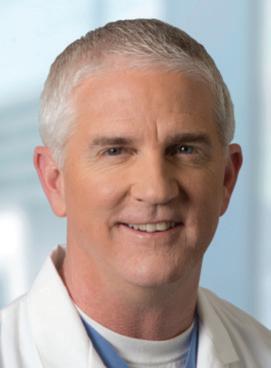LEADING MEDICINE

DON’





Dr. David Mobley
If you’re having difficulty with your urinary tract or male reproductive organs, a urologist is the specialist who can help. Urologists treat conditions of the kidneys, bladder, ureters and urethra as well as the penis, prostate and testicles.
“Many conditions of the urinary tract are common,” explained Dr. David Mobley, a urologist at Houston Methodist West Hospital. “My patients often find relief once we’re able to diagnose and start treating their conditions.”
Mobley explained some common reasons why patients seek out a urologist.
A urologist can help determine whether you have urge incontinence (an urge so strong that you leak before getting to the toilet) or stress incontinence (when the muscles that support the bladder are weakened). Many treatments are available for these conditions.
All men will eventually face a decrease in erection quality, which comes with age. A urologist can help you decide on a treatment. Options include injected and oral medications and, in some cases, prosthetic surgery, if recommended.
Urinary tract infection (UTI) is one of the most common urologic conditions among women — 60% of whom will experience at least one in her lifetime. A bacterial infection in the urinary tract can cause painful burning upon urination, along with other symptoms.
“Your primary care provider can help with a single UTI,” Mobley explained. “A urologist can help when UTIs happen over and over or don’t respond to antibiotic medication.”
Kidney stones occur when chemicals build up in the urine and crystalize to form a solid object in the kidneys that come in various sizes, from a grain of sand to a golf ball. The pain is severe and starts and stops suddenly. “Your urologist can prescribe medications to help a small stone, but it is not uncommon to need some type of surgery,” Mobley said.
A urologist can help you find the cause of an overactive bladder, whether it’s a common problem, such as a UTI, kidney stone, diabetes, advanced age or a neurologic disorder. There are several excellent treatment options for this very common condition.
Pelvic floor therapy can help with a broad category of concerns that include urinary and fecal incontinence and pelvic organ prolapse. This therapy works to reduce stress on the muscles of the pelvic floor to reduce pain and make urination easier.
Generally, urologists help men with two primary prostate problems — benign prostatic hyperplasia and prostate cancer. “The best outcome for a man with prostate cancer is to find it early, so be sure to get screened when it’s time,” Mobley said. •
Whether it’s ongoing UTIs, incontinence or something more serious, talking to a specialist is only a click or call away. To schedule an appointment with a urologist at Houston Methodist West, visit houstonmethodist.org/spg/urology/katy or call 832.522.8300 .


SYMPTOMS
Prevention and early detection are powerful tools in the fight against gynecologic cancers.
Dr. Behrouz Zand, a gynecologic oncologist at Houston Methodist West Hospital, explained the facts you should know.
Fact: Symptoms can be subtle or vague, attributed to other conditions, or ignored until they’re severe. Examples include:
■ Abdominal pressure
■ Abnormal bleeding and discharge
■ Fullness
■ Pelvic discomfort
■ Swelling or bloating
■ Urinary urgency
Symptoms of gynecologic cancers generally get worse over time.
Action: Gynecologic cancers, especially ovarian cancer, are subtle and hard to identify. This makes it easy for you to ignore the signs and put off regular screenings.
“Many people believe if there’s no pain or subtle pain, there’s no reason for concern,” Zand said. “However, this is a dangerous myth. It’s crucial to listen to your body — early detection can sometimes mean the difference between a manageable condition and a lifethreatening situation.”
Fact: Each type of gynecologic cancer may require different screening and
detection strategies, reflecting its unique characteristics and symptoms. Some of these include Pap test, pelvic exam, blood test or ultrasound.
“Understanding the diverse nature of gynecologic cancers is crucial for early detection and effective treatment,” Zand said. “It’s important to recognize that the Pap test and HPV test do not screen for ovarian, uterine or vulvar cancers, among others.”
Action: Maintain open communication with your health care provider about any changes or symptoms you experience, no matter how severe. Your doctor can help determine how often you should be screened.
Fact: Gynecologic cancers can be managed effectively through a combination of surgery, chemotherapy and targeted therapy. While not all cancers are curable, with tailored treatment plans many women can lead fulfilling lives.
“Every woman’s journey with gynecologic cancer is distinct, and it’s important to have a personalized treatment plan that caters to the specific type of cancer, its stage, the patient’s overall health and her unique genetic predispositions,” Zand explained.
Action: Detailed dialogue with your health care provider about medical history, genetic factors, lifestyle choices and even the slightest symptoms will help your provider develop the most personalized care plan for your unique needs.
Fact: Each type of gynecologic cancer has its risk factors and prevention strategies. Lifestyle modifications such as maintaining a healthy weight, adopting a balanced diet rich in fruits and vegetables, and engaging in regular physical activity can significantly reduce the risk of uterine cancers.
Action: Take a proactive stance on your health by getting vaccinated against HPV and discuss with your doctor the best screening practices for your individual needs based on your age, family history and personal health background.
“While we champion the HPV vaccine, we also advocate for regular screening visits to aid in the early detection of other gynecologic cancers,” Zand explained. “We are equipped with more knowledge and tools for the prevention and treatment of gynecologic cancers than ever before.” •
There is always hope in the fight against gynecologic cancer, and it begins with you. To find a specialist, visit houstonmethodist.org/ gynecology or call 832.522.5522 .

 Dr. Christopher K. Smith
Dr. Christopher K. Smith
Osteoarthritis is often known as a wear-andtear disease. Unfortunately, when osteoarthritis strikes the knees, you may decide to take it easy and opt out of the activities you once enjoyed. While patients with osteoarthritis may experience knee pain during exercise, physical activity by itself is rarely the cause. “The real culprit for osteoarthritis is genetics or injury,” explained Dr. Christopher Smith, orthopedic surgeon at Houston Methodist West Hospital. “If your parents both had knee replacements, chances are higher you’ll have a problem, too,” Smith said. “My goal is to help you move past your knee pain and stay active longer.”
Even though osteoarthritis is a wear-and-tear disease, living an active lifestyle can help manage the pain.
Osteoarthritis is the disease process of losing the cartilage in your knee — the tissue that cushions the ends of bones to decrease friction with joint movement. This is different from rheumatoid arthritis, a condition where the immune system attacks joints and their lining.
You should consult a doctor who can diagnose your knee pain as a symptom of osteoarthrosis or something else. Osteoarthritis has hallmark signs, which may include:
■ Inflammation and swelling
■ Joint tenderness or a feeling of the joint giving out
■ Pain described as deep and aching
■ Stiffness at times, though more common with rheumatoid arthritis
■ Varying amounts of discomfort during an activity or prolonged inactivity
“While pain often occurs while standing, running or walking, it can also occur when sitting for extended periods of time,” Smith explained. “You probably notice it most often when using the stairs.”
Family history, aging or injury are the common causes of osteoarthritis. While some studies indicate supplements such as glucosamine can help, there are actions you can take to reduce pain, including:
■ Building strength, especially in the quadriceps (muscles that control the knee) and hips
■ Managing weight to decrease stress on the joints
■ Quitting smoking, because it lowers blood supply and delays healing
“Strength training, exercise and maintaining a healthy weight are important,” Smith said. “The mechanical forces across the knee joint are unique. If you’re overweight, any amount of weight loss could make a big difference since one pound on your body is anywhere between four and nine pounds on your knee.”
If your symptoms lead you to decreased physical activity, you may inadvertently add to the problem.
The good news? Your doctor can help you manage osteoarthritis pain by ensuring that your fitness routine builds muscles around the knees. With regular check-ins, your doctor will monitor your symptoms and, if needed, adjust your plan.
When medical care is needed, it often starts with these steps:
1. Topical ointments are available over the counter and deliver skin irritants that stimulate blood flow to decrease pain.
2. Oral medications, such as an over-the-counter acetaminophen or a prescribed anti-inflammatory can help with pain and swelling but require close monitoring of your kidney function by your doctor.
3. Injection therapies are administered by your doctor in the office. He or she will recommend corticosteroids, hyaluronic acid or platelet-rich plasma (PRP) injections, depending on your need.
There is no one-size-fits-all approach. Your doctor will help determine the best course of action for your knees. •
If you are ready to take control of your osteoarthritis or get back in the game of life, we can help. Talk with a doctor to learn more about whether joint replacement is right for you. To schedule an evaluation, visit houstonmethodist.org/jointpain or call
If osteoarthritis knee pain is coming between you and your fitness routine, consult your doctor. He or she may recommend exercise modifications to help build strength, manage weight and decrease pain symptoms, such as:
Joining a water aerobics class
Riding a bike on an even terrain

Starting a swim routine
Strength training with a professional trainer

Trying light elliptical or stationary bike exercises
Walking or hiking on a trail with soft ground
When these exercises no longer offer you relief, it’s time to talk to your doctor about injections or surgery.


It’s normal to feel overwhelmed if you or a loved one needs heart valve surgery. Dr. Mini Sivadasan, a cardiothoracic surgeon at Houston Methodist West Hospital, answered some questions patients frequently ask.
Q: WHAT DO HEART VALVES DO?
The heart has four valves. They’re responsible for keeping blood moving in a circular pattern in your heart. The aortic and mitral valves are located on the left side. The pulmonary and tricuspid valves are on the right. Each valve has flaps that work like a gate. The gate opens to let blood through and closes before blood can flow backward.
Q: WHAT ARE THE SIGNS MY HEART VALVE HAS A PROBLEM?
Symptoms vary — some people have no symptoms and others deny or compromise the cues over time, making their symptoms barely noticeable. Still others notice the signs right away, including:
■ Chest pain
■ Lightheadedness
■ Shortness of breath
■ Unusual swelling in the ankles
You should keep a journal of what you were doing, the pain you felt and the time of day when you noticed one of the above symptoms. This will help your doctor monitor your heart and act when needed. Make sure to keep regular check-ups with your doctor and take more of an active role in your health.
Q: WHY DO HEART VALVES NEED SURGERY?
Over time or under certain conditions, heart valves can weaken or harden, preventing blood from circulating properly. Regurgitation is a condition in which the flaps don’t seal properly, causing blood to flow in the wrong direction. If a valve is only slightly damaged, a surgeon may be able to repair it by removing worn-out tissue and placing a ring to help the valve keep its shape. “When conditions worsen, patients may require medication or surgery,” Sivadasan added.
Q: WHAT ARE THE TYPES OF HEART VALVE SURGERY?
In open heart surgery, the surgeon makes an incision down the middle of the chest and cuts the sternal bone, and then repairs the damaged valve or replaces it with a new valve. Minimally invasive heart surgery is done through a much smaller incision, on the side of the chest, approaching the heart and damaged valves between the ribs — without breaking any bones and enabling a quicker recovery. “We will find the surgery that is best for you,” Sivadasan said. •
Our experts are here to help you live your best life. To make an appointment, visit houstonmethodist.org/ debakey/west or call 832.522.5522


What’s the best way to relieve the bloating and abdominal tenderness of constipation and get those bowel movements back to normal?
“The best way to prevent constipation is lifestyle changes,” advised Dr. Shawn Gurwara, a gastroenterologist at Houston Methodist West Hospital. Here are five suggestions from Gurwara for preventing or relieving constipation.
The number one recommendation to alter your diet is to include plenty of fresh fruits, vegetables and whole grains. “Not only do these foods provide healthy sources of energy,” Gurwara explained, “but they are great fiber sources, key for keeping waste moving through your GI tract and promoting regular bowel movements.”
High-fiber foods include:
■ Beans and lentils
■ Fruits, especially kiwis, prunes, avocados, berries, pears and apples
■ Nuts and seeds, especially almonds, pistachios, and chia and flax seeds
■ Veggies, such as squashes, broccoli, mushrooms, kale and spinach
■ Whole grains, including quinoa, whole wheat pasta, oatmeal and barley
“Unless you have other health conditions that prohibit your water intake, you should drink at least 64 ounces of water per day,” Gurwara recommended.
Tips for staying hydrated include:
■ Carrying a water bottle with you for sipping throughout the day
■ Drinking a glass of water with every meal
■ Snacking on foods with high water content, such as cucumbers, celery and oranges
■ Trying unsweetened sparkling water or adding fresh fruits, vegetables and herbs to your water
“Physical activity, such as walking, is critical for preventing constipation, as it stimulates your gut to move,” Gurwara said. Adults should ideally get at least 150 minutes of exercise per week.
When you’re already constipated and need relief, over-the-counter medications can help. “A mild type of osmotic laxative, such as polyethylene glycol, would be a good first choice,” Gurwara said. “These laxatives work to soften stool and make it easier to pass by drawing water into your colon.”
Another over-the-counter option is a stimulant laxative that causes muscles in the GI tract walls to contract and speed up bowel movements. These laxatives work much faster than osmotic ones, but can come with uncomfortable side effects, such as cramping and diarrhea.
If you’ve tried all the above and are still having infrequent or painful bowel movements after several weeks, it’s time to talk to your doctor. Chronic constipation that lasts longer than four weeks can still be caused by lack of fiber or water. But if you’ve tried various lifestyle remedies with no change, your doctor can make recommended adjustments and possibly consider other treatments.
“You should reach out to your doctor right away if, during any bout of constipation, you have experienced blood in your stool, severe abdominal pain, nausea or vomiting, or have a family history of colon cancer,” Gurwara advised. •
You can find relief by speaking to a gastroenterologist. To schedule an appointment, visit houstonmethodist. org/gi-west or call 832.522.8560.











At Houston Methodist Orthopedics & Sports Medicine, we know that joint pain affects every part of your life. With treatment plans customized for you, our specialists in Katy and West Houston offer a full range of advanced nonsurgical and surgical techniques. Our expert joint care includes:
• Innovative pain control methods
• Physical therapy to improve mobility and range of motion
• The latest technology, including minimally invasive surgical techniques that help reduce recovery time Katy-West Houston




Schedule an appointment: houstonmethodist.org/jointpain
832.522.8280